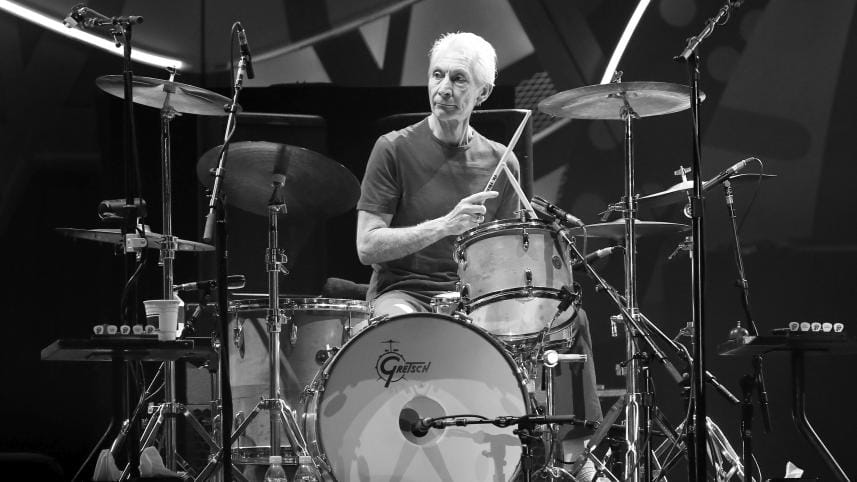Charlie Watts: To the Beat of the Rolling Stones

PART I
It was late 1984. The Rolling Stones were in Amsterdam for a meeting. Author Travis Nichols was with the Stones. He and Mick Jagger went out at night. The hard partying lifestyle of the Stones was nothing new. Travis and Mick returned back to their hotel around five in the morning. Mick wanted to call Charlie Watts. Travis told Mick not to call Charlie so late. Mick took up the phone.
"Where's my drummer?"
No response. Mick put the phone down.
Charlie was not at all amused. It took a lot to get on his nerves. That phone call from Mick did do the impossible. Charlie got up. He shaved and wore his best cologne. He put on one of his tailored Savile Row suits. He dressed up immaculately as he always did. Silently, he made his way to Mick's room.
Charlie knocked on Mick's door. Travis opened the door. Charlie didn't say a word. He went straight to Mick and pulled him up with his left hand. "Don't ever call me your drummer. You're my singer." With his impeccable timing with beats on the drums, he punched Mick with a massive right hook. Mick fell on the table where a silver platter of smoked salmon was placed.
The quiet man of the Rolling Stones passed away August 24, 2021, in a hospital in London, surrounded by his family.
PART II
Charlie Watts never qualified as a rock star like other members of the Rolling Stones. He was silent, almost invisible while the front men, mainly Mick Jagger and Keith Richards, stole the attention on and off stage. Charlie was not at all interested in rock n' roll in the beginning. He had no liking for Elvis, but did have an ear for Duke Ellington, Miles Davis and Charles Mingus.
After hearing the drummer Chico Hamilton, he decided he would be a drummer. Blues and jazz were his genre. Rock n' roll was his "daytime job". That proved to be the signature beat of the Stones. Rock n' roll with a tinge of the blues and jazz separated them from others.
Charlie was not flamboyant like John Bonham of Led Zeppelin; Keith Moon of The Who; or Ginger Baker of Cream. Those drummers had the calibre to become one of the lead members of the band. Charlie liked to play and blend in with the band than do outstanding solos. He ended up being the silent one in the band. Although he was a slow learner, over time, he became the heartbeat of the Rolling Stones both on stage; in the studio; and also off stage being the rock in turbulent times.
PART III
In his 2010 autobiography Life, Keith Richards said, "Charlie Watts has always been the bed that I lie on musically." On the surface people see Mick and Keith as the Rolling Stones. The deeper you dig, "Charlie Watts's snare sound is the Rolling Stones." Keith went the length to state the Stones would not perform without Charlie. "No Charlie, no Stones" was his definitive answer.
You can't ride a locomotive without an engine. Charlie was that engine. As Ron Wood rightly said in 2003, "Charlie's the engine... And we don't go anywhere without the engine."
Unfortunately, Charlie had to pull out of their latest No Filter tour due to declining health. Since 1963, this would be the first time the Stones would be without their engine Charlie Watts. If the Stones keep on rolling, it won't be the last time either.
Mick Jagger's epitaph of Charlie was a photo of Charlie on the drums with no caption. The Stones may keep rolling, but without Watts, the heartbeat will always be missing. The trained ears of the Stones' music will feel that absence as much as the Stones themselves, and Shirley his wife, Seraphina his daughter, and Charlotte his granddaughter.
Asrar Chowdhury is a professor of Economics at Jahangirnagar University. He is the author of the fornightly column Echoes in SHOUT, The Daily Star. Email: asrarul@gmail.com; asrarul@juniv.edu



 For all latest news, follow The Daily Star's Google News channel.
For all latest news, follow The Daily Star's Google News channel.
Comments